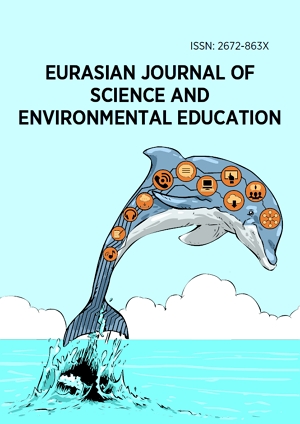Research Article
Harnessing the Beast - COVID-19: Integrative Knowledge-Building with LCT Autonomy
More Detail
1 Stellenbosch University, SOUTH AFRICA* Corresponding Author
Eurasian Journal of Science and Environmental Education, 1(1), December 2021, 27-42, https://doi.org/10.30935/ejsee/11869
Published: 15 December 2021
OPEN ACCESS 1734 Views 873 Downloads
ABSTRACT
Cytology is one of the core sections of introductory first-year Biology courses. Laboratory practicals form an integral component of these Cytology curricula - experiential learning through microscopy which students find fascinating and engaging. In contrast, we found that students are much less enthusiastic about the theory part presented during lectures – they perceive the content as being complex, high in volume and due to scale, often purely theoretical. Applicable real-world context is often far removed from the lived experiences of most students. However, the dramatic arrival of Coronavirus disease (COVID-19) early in 2020 presented vast and new possibilities for these lectures and was therefore selected as narrative to teach certain Cytology concepts to improve engagement and equip students for the future challenge. The ARCS (Attention, Relevance, Confidence and Satisfaction) Model of Motivational Design Theories underpins the rationale for using this narrative, whereas the Autonomy dimension of Legitimation Code Theory served as a theoretical framework to enable integrative knowledge-building. This strategy integrated two different bodies of knowledge, science and health science. It further harnessed the uncertainty caused by the novel virus to evoke a deeper level of curiosity and motivation among the students, who were visibly engaged in this Cytology offering.
CITATION (APA)
Mouton, M. (2021). Harnessing the Beast - COVID-19: Integrative Knowledge-Building with LCT Autonomy. Eurasian Journal of Science and Environmental Education, 1(1), 27-42. https://doi.org/10.30935/ejsee/11869
REFERENCES
- Cucinotta, D., & Vanelli, M. (2020). WHO declares COVID-19 a pandemic. Acta Biomedica, 19, 91(1), 157-160. https://doi:10.23750/abm.v91i1.9397
- Daggett, W. R. (2016). Rigor/relevance framework: A guide to focusing resources to increase student performance. International Center for Leadership in Education, https://leadered.com, https://bit.ly/3vyHjI9
- Daggett, W. R., & Nussbaum, P. D. (2008). How brain research relates to rigor, relevance and relationships. http://citeseerx.ist.psu.edu, https://bit.ly/3C6YUt5
- Harris, M. (2011). Using YouTube to enhance student engagement. Faculty Focus. Focused on Today’s Higher Education Professional, https://www.facultyfocus.com, https://bit.ly/2ZinVn4
- Jandhyala, D. (2017). Visual Learning: 6 Reasons why visuals are the most powerful aspect of e-learning. https://elearningindustry.com , https://bit.ly/3C4Q6nr
- Keller, J. M. (1987). Development and use of the ARCS model of instructional design. Journal of instructional development, 10, 2. https://doi.org/10.1007/BF02905780
- Keller, J. M. (2010). Motivational design for learning and performance: The ARCS model approach. Springer Science & Business Media.
- Maton, K. (2014a). Knowledge and knowers: Towards a realist sociology of education. Routledge.
- Maton, K. (2014b). A tall order? Legitimation Code Theory for academic language and learning. Journal of Academic Language and Learning, 8(3), A34-A48. https://journal.aall.org.au/, https://bit.ly/3vyp31s
- Maton, K., & Howard, S. K. (2018). Taking autonomy tours: A key to integrative knowledge-building. LCT Centre Occasional Paper 1. Legitimation Code Theory. https://bit.ly/2Zf9XBO
- Maton, K., & Howard, S. K. (2020). Autonomy tours: Building knowledge from diverse sources. Educational Linguistic Studies, 2, 50–79. https://bit.ly/3nlgzHc
- Maton, K., & Howard, S. K. (2021). Targeting science: Successfully integrating science Mathematics into science teaching. In K. Maton, J.R. Martin, & Y.J. Doran (Eds), Teaching science: Knowledge, language, pedagogy. Routledge.
- Mouton, M. (2020). A case for project based learning to enact semantic waves: towards cumulative knowledge building. Journal of Biological Education, 54(4), 363-380. https://doi.org/10.1080/00219266.2019.1585379
- Mouton, M., & Archer, E. (2019). Legitimation Code Theory to facilitate the transition from high school to first-year biology. Journal of Biological Education, 53(1), 2-20. https://doi.org/10.1080/00219266.2017.1420681
- Murphy, C. (2019). Exploring the role of visual imagery in learning mathematics. In G. Hine, S. Blackley, & A. Cooke (Eds.), Proceedings of the 42nd annual conference of the Mathematics Education Research Group of Australasia (pp. 508-515). Perth.
- Rothman, D. (2014). A tsunami of learners called Generation Z. Public Safety: A State of Mind, 1(1), 1-5. https://mdle.net , https://bit.ly/3jsMcxz
- Schwartz, D. L., & Heiser, J. (2006). Spatial representations and imagery in learning. In R. K. Sawyer (Ed.), The Cambridge Handbook of the Learning Sciences (pp. 283-298). Cambridge University Press.
- Taylor, M., Marrone, M., Tayar, M., & Mueller, B. (2018). Digital storytelling and visual metaphor in lectures: a study of student engagement. Accounting Education, 27(6), 552-569. https://doi.org/10.1080/09639284.2017.1361848
- World Health Organization. (2020a). An ad hoc WHO technical consultation managing the COVID-19 infodemic: call for action. 7-8 April 2020. https://www.who.int/publications/i/item/9789240010314
- World Health Organization. (2020b). Novel Coronavirus, Situation Report -1, 21 January 2020. https://www.who.int, https://bit.ly/3aY0Hoy
- World Health Organization. (2020c). Coronavirus disease 2019 (COVID-19), Situation Report - 41, 1 March 2020. https://www.who.int, https://bit.ly/3pqPUvq
- World Health Organization. (2020d). Coronavirus disease 2019 (COVID-19), Situation Report - 51, 11 March 2020. https://www.who.int, https://bit.ly/3vzeWtg
- World Health Organization. (2020e). Coronavirus disease 2019 (COVID-19), Situation Report - 71, 31 March 2020. https://www.who.int, https://bit.ly/3m4ZQsD
- Yousuf, B., & Conlan, O. (2018). Supporting student engagement through explorable visual narratives. IEEE Transactions of Learning Technologies, 11(3), 307-320. https://doi.org/10.1109/TLT.2017.2722416

 The articles published in this journal are licensed under the CC-BY Creative Commons Attribution International License.
The articles published in this journal are licensed under the CC-BY Creative Commons Attribution International License.